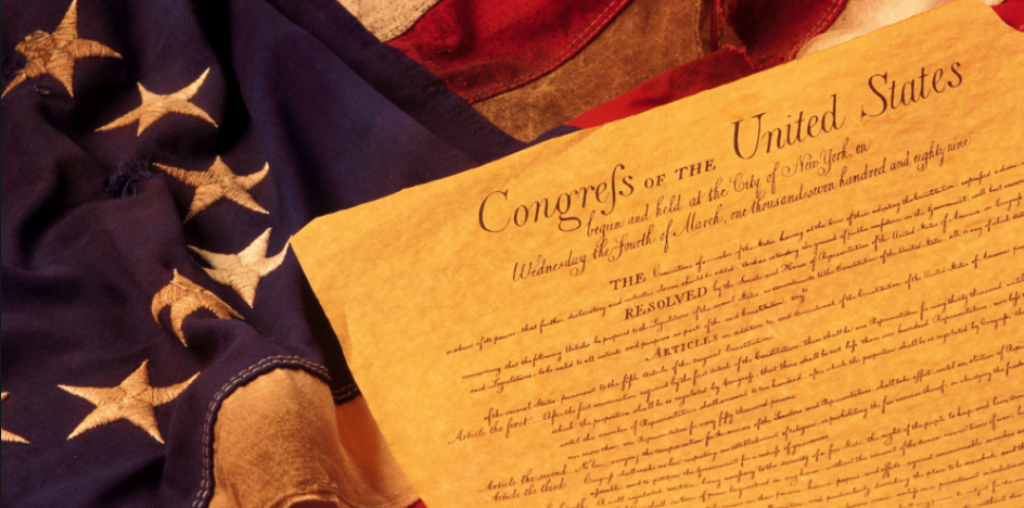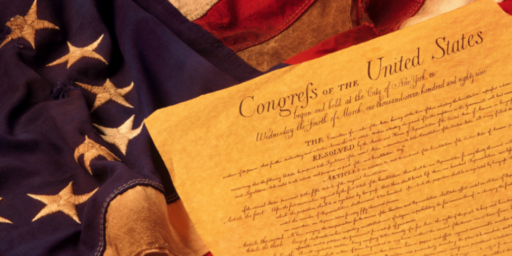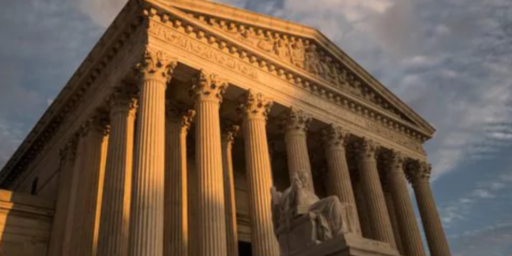Supreme Court Places Limits On Civil Asset Forfeiture
The Supreme Court issued a ruling that places new limits on civil asset forfeiture by state and local government.

The Supreme Court handed down what is likely to be a landmark ruling that restrains the ability of state and local jurisdictions to seize property as part of a criminal case, holding that the Eighth Amendment’s ban on excessive fines applies to the states and the practice of so-called civil asset forfeiture:
WASHINGTON — Siding with a small time drug offender in Indiana whose $42,000 Land Rover was seized by law enforcement officials, the Supreme Court on Wednesday ruled that the Constitution places limits on civil forfeiture laws that allow states and localities to take and keep private property used to commit crimes.
Civil forfeiture is a popular way to raise revenue, and its use has been the subject of widespread criticism across the political spectrum.
In a 2017 opinion, Justice Clarence Thomas wrote that “this system — where police can seize property with limited judicial oversight and retain it for their own use — has led to egregious and well-chronicled abuses.” His opinion cited reporting from The Washington Post and The New Yorker.
The Supreme Court has ruled that the Eighth Amendment, which bars “excessive fines,” limits the ability of the federal government to seize property. On Wednesday, the court ruled that the clause also applies to the states.
Previously, the Supreme Court had never squarely addressed that question. It had addressed the status of the Excessive Fines Clause, but only in the context of the federal government. The court had, however, previously ruled that most protections under the Bill of Rights apply to the states — or were incorporated against them, in the legal jargon — under the 14th Amendment, one of the post-Civil War amendments.
Justice Ruth Bader Ginsburg, writing for eight justices, said the question was an easy one. “The historical and logical case for concluding that the 14th Amendment incorporates the Excessive Fines Clause is overwhelming,” she wrote.
“For good reason, the protection against excessive fines has been a constant shield throughout Anglo-American history: Exorbitant tolls undermine other constitutional liberties,” she wrote. “Excessive fines can be used, for example, to retaliate against or chill the speech of political enemies.”
“Even absent a political motive,” she wrote, quoting from an earlier decision, “fines may be employed ‘in a measure out of accord with the penal goals of retribution and deterrence,’ for ‘fines are a source of revenue,’ while other forms of punishment ‘cost a state money.”
Justice Ginsburg wrote that excessive fines have played a dark role in this nation’s history.
“Following the Civil War,” she wrote, “Southern States enacted Black Codes to subjugate slaves and maintain the prewar racial hierarchy. Among these laws’ provisions were draconian fines for violating broad proscriptions on ‘vagrancy’ and other dubious offenses.”
Amy Howe posts her analysis at SCOTUSBlog:
The Supreme Court today ruled that the Eighth Amendment’s ban on excessive fines applies to the states. The decision is a victory for an Indiana man whose luxury SUV was seized after he pleaded guilty to selling heroin. It is also a blow to state and local governments, for whom fines and forfeitures have become an important source of funds.
(…)
Timbs asked the Supreme Court to weigh in, and today the justices held that the Eighth Amendment’s ban on excessive fines does indeed apply to the states. In an opinion by Justice Ruth Bader Ginsburg, the court seemed to regard the basic question before it as an easy one. The justices explained that the “historical and logical case for concluding that” the ban on excessive fines applies to the states through the 14th Amendment – which bars states from depriving anyone “of life, liberty, or property, without due process of law” – is “overwhelming.”
Even Indiana, the court noted, did not seriously challenge whether the ban on excessive fines applies to the states. Instead, it argued that the ban applies only to payments imposed as punishment and does not apply to this case, which involves the forfeiture of property used to violate the law, a procedure that was not traditionally regarded as a fine. But because the state did not make that argument in the Indiana Supreme Court, the U.S. Supreme Court emphasized today, the court would not consider it. And it doesn’t matter whether the ban on excessive forfeitures of property was traditionally regarded as fundamental, the court explained; what matters is that the broader right to be protected from excessive fines has been regarded that way.
Justice Clarence Thomas agreed that the ban on excessive fines applies to the states, but he would have reached that result in a different way. Instead of relying on the due process clause of the 14th Amendment, Thomas would hold that the ban on excessive fines is “one of the ‘privileges or immunities of citizens of the United States’ protected by the Fourteenth Amendment.” Justice Neil Gorsuch echoed that thought in a separate opinion, but (unlike Thomas) he joined the court’s opinion, stressing that “nothing in the case turns on that question, and, regardless of the precise vehicle, there can be no serious doubt that the Fourteenth Amendment requires the States to respect the freedom from excessive fines enshrined in the Eighth Amendment.”
The roots of the case lie in the arrest of Tyson Timbs on drug possession and distribution charges. At the time Timbs was arrested, authorities used the civil asset forfeiture provisions of Indiana law to seize a $42,000 Land Rover owned by Timbs. Timbs was later able to prove that he had obtained the proceeds to purchase the vehicle with the proceeds from a life insurance policy taken out by his late father Unfortunately for Mr. Timbs used the Land Rover to drive to a drug deal that turned out to be a police sting operation. Timbs later plead guilty to selling $225 worth of heroin to an undercover cop and was sentenced to one year of house arrest, five years probation, and fines totaling $1,200. Despite this apparent plea agreement, Indiana kept the vehicle with the apparent intention of selling it and keeping the proceeds.
Timbs filed a lawsuit seeking to get the vehicle back and, at least in the initial rounds, found success in Court. At the trial court level, the trial Judge found that the proposed sale violated the Eighth Amendment’s Excessive Fines Clause. In support of this argument, the Judge noted that the vehicle was worth four times the maximum fine for the crimes with which Timbs had been charged and that it was thirty times the fines that were actually imposed in the case. Based on this, it’s worth noting that in 1993 the Supreme Court had found in Austin v. United States, 509 U.S. 602 (1993) that the Eighth Amendment’s “excessive fines” provision applied to civil asset forfeiture. In that case, the Court found that the seizure of the Defendant’s vehicle violated that provision of the Eighth Amendment. That case, however, only applied to the Federal Government. In the Timbs case, an intermediate appeals court at the state level agreed with the trial court Judge on the excessive fines issue, but Indiana’s Supreme Court sided with the state, partly on the ground that the U.S. Supreme Court had not ruled on the question of whether the Excessive Fines Clause applied to the states. It is that ruling that was appealed to the Justices.
Generally speaking, the fact the Justices found that the Eighth Amendment’s excessive fines provision applies to the states is not in and of itself a surprising legal development. In fact, it is simply a continuation of a trend that has been going on for the better part of a century now under which, piece by piece, nearly the entirety of the Bill of Rights have been applied to the states through the due process clause of the 14th Amendment. the Supreme Court has decided over the course of a series of cases decided since the 1940s that most of the provisions of the Bill of Rights apply to the state through the 14th Amendment’s due process clause. Since this incorporation has, thanks to the nature of the way cases are presented to the Court, happened on a case-by-case basis, with the most recent such case having been decided in 2010 in McDonald v. Chicago in which the Court held that the Second Amendment as interpreted by District of Columbia v. Heller applied to the states. Still, there remain some provisions of the Bill of Rights do not apply to the states. These include the Grand Jury Clause in the Fifth Amendment, the requirement of unanimity for criminal juries that has been read into the Sixth Amendment, the Seventh Amendment’s requirement of juries in civil cases, the Third Amendment, and, until now, the Excessive Fines Clause of the Eighth Amendment.
The one issue that was not before the Court was the specific issue of whether or not the seizure of Timbs’ vehicle was itself a violation of the “excessive fines” clause. Now that the Court has ruled that this provision applies to the states, the case will now be remanded back to the state courts, which will be charged with determining whether this specific seizure violates the clause, an issue that could lead to a further round of appeals that could lead to another case before in the Supreme Court in the future. Before that happens, though, it’s not an understatement to say that this constitutes a great victory in the fight against an unjust criminal justice system and that extent to which states and localities have gotten away with violating private property rights, and the Constitution, in the name of “civil asset forfeiture.” At least in the short term, this likely means that the Federal Courts, and courts at the state level, will need to deal with the question of whether or not individual seizures violate the clause. Eventually, we’ll get a general idea of what the clause does and does not allow based on what the courts decide, but that process will take some time. Hopefully, though, this will lead to some restraint on the part of law enforcement in this area, as well as a spur for states to enact reforms at the legislative level. Reform of this practice is long overdue, and the Court just issued an opinion that goes a long way toward helping that process along.
Here’s the opinion:
Timbs v Indiana Opinion by on Scribd






FINALLY!
@grumpy realist:
+1 and Unanimous. Had begun believing an unanimous SC decision only happened in the past.
Civil asset forfeiture is clearly a fine. If it isn’t, then it’s outright theft.
I’d categorize it as worse than a merely excessive fine. it’s an excessive, conditional fine. that is, the fine for X felony is Y dollars, unless you happen to own some pricey assets which can be easily sold, then it’s Y dollars plus the value of those assets.
The practice really needs to end.
It’s honestly hard to conceive of an American political belief system that’s okay with the state being able to seize the property of citizens without Due Process of Law. And yet we’ve allowed it to happen, routinely, for decades. It’s shocking that it’s taken the Supreme Court this long to finally weigh in.
@James Joyner:
What’s worse are the cases where the state has been allowed to keep the property, or the proceeds therefrom, even in cases where the Defendant has been acquitted of the underlying charge or where the property is actually owned by someone else.
As for why it’s taken this long, I don’t know the history of how many cases like this have been presented to the Justices in the past that they’ve passed on for one reason or another, but the Court can’t go out on the hunt for cases to rule on. They have to wait for the cases to come to them. That’s one reason why some provisions of the Bill of Rights have yet to be incorporated against the states. I’m sure they would if the proper case got before the Court but that hasn’t happened yet.
@Sleeping Dog: Well, kind of unanimous. Unanimous in result, but not in reasoning. Thomas’s argument that the decision should have been based on the privileges and immunities clause rather than the due process clause could, if accepted, have some serious ramifications.
It’s worth noting that he dropped this jewel into the opinion: “And because the Court’s substantive due process precedents allow the Court to fashion fundamental rights without any textual constraints, it is equally unsurprising that among these precedents are some of the Court’s most notoriously incorrect decisions. E.g., Roe v. Wade, 410 U. S. 113 (1973); Dred Scott v. Sandford, 19 How. 393, 450 (1857).”
So in the space of a couple of days he essentially advocates overturning NY Times v. Sullivan and Roe v. Wade and lays the groundwork for overturning countless other decisions. Just another reminder that we have people on this court that are not remotely conservative by any traditional definition of that word.
@Roger: Although it’s worth noting that Dred Scot is one of the most reviled decisions in SCOTUS history, if one rendered moot by the 13th and 14th Amendments.
Dawg Damn, long overdue.
@James Joyner: Yes. Rightly reviled. Which is why placing it next to Roe v Wade is so telling.
But certainly not surprising…Thomas and people like him believe that the fetus should have all the same rights as a fully formed person…as such, there will never be a way to come to any kind of compromise on abortion that is acceptable to both sides…
@James Joyner: Yes. Rightly reviled. Which is why it’s so telling that he lists it with Roe v. Wade.
@An Interested Party:
I’ll believe this motivation is sincere when they start advocating for assault/battery charges on pregnant women who smoke, drink, or otherwise take actions or fail to act in a way that results in direct or indirect harm of the embryo/fetus, or when they start demanding the police investigate every miscarriage under pretense of possible murder, or when they demand that the gub’mint should be mandating how women should be eating, drinking, working, traveling, or being present in restricted environmental conditions…but only when and while pregnant.
@An Interested Party:
No, that would be an improvement. They believe that the fetus has significantly more rights than a child, much less an adult human.
“Life begins at conception”… but apparently the rights that go with that end at birth.
@Robert in SF:
Oh, there are plenty of true believers. 5 seconds on google finds this recent study: http://jaapl.org/content/45/2/193 . Problem is, once the child is born and a parent or parents have difficulty taking care of them, they think the choice should be either the child should be adopted by “good parents” or the child is just going to have to suffer. Because their tax breaks mean more to them than children.
@Robert in SF:
5 more seconds… https://www.damemagazine.com/2018/05/16/a-new-legal-tactic-could-make-miscarriage-a-crime/
@Han: For those that might dismiss that link as having an agenda, the NYT: https://www.nytimes.com/interactive/2018/12/28/opinion/abortion-pregnancy-pro-life.html